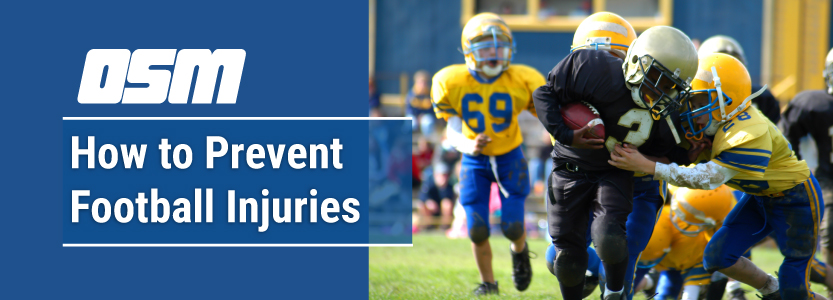How to Prevent Football Injuries
How to prevent football injuries
Focus on proper biomechanics
– Everything is connected, and if your body’s mechanics are out of alignment in one area, it can cause injury elsewhere. For example, “Core and hip stabilization is key to preventing knee and ankle injury, and scapular thoracic stabilization is critical to preventing shoulder injury,” Dr. Williams said. Talk with a sports medicine specialist about evaluating and correcting ongoing biomechanical issues.
Get enough rest
Fatigue is more than just feeling tired after a two-a-day. It’s a deeper sense that your body’s resources are depleted, which can slow down recovery and healing. When you’re working hard on the practice field, prioritize rest off the field to help your body cope.
Warm up right
Avoid prolonged stretching of cold muscles before a workout. That outdated idea can actually increase injury risk. Instead, do some dynamic warm-ups, light versions of the activity you’ll be doing. You could start with a slow jog, followed by throwing and catching the football.
Strengthen that core
A strong core sets the stage for proper form from head to toe, because the core muscles stabilize the limbs. Remember, the core is not just the back and abdominal muscles at the surface. It’s also little-used muscles deep within the torso and abdomen that need attention.
Stay hydrated
Hydration is the foundation on which the rest of the workout is built. Being dehydrated can reduce performance, leading athletes to push themselves too hard and increasing injury risk. Talk with your sports medicine provider, your coaches, and your trainer about how to assess your hydration each day.
Don’t overtrain
When it comes to an intense sport like football, the pressure to overtrain can be huge. But more is not always more. Pushing yourself too hard can lead to exhaustion and poor form, making overuse injuries worse or increasing your risk of a new injury. Make sure your body has the time it needs to fuel up, hydrate, and rest to promote recovery. Your performance will be stronger in the long run.
The Orthopedic & Sports Medicine Center of Oregon is an award-winning, board-certified orthopedic group located in downtown Portland Oregon. We utilize both surgical and nonsurgical means to treat musculoskeletal trauma, spine diseases, foot and ankle conditions, sports injuries, degenerative diseases, infections, tumors and congenital disorders.
Our mission is to return our patients back to pain-free mobility and full strength as quickly and painlessly as possible using both surgical and non-surgical orthopedic procedures.
Our expert physicians provide leading-edge, comprehensive care in the diagnosis and treatment of orthopedic conditions, including total joint replacement and sports medicine. We apply the latest state-of-the-art techniques in order to return our patients to their active lifestyle.
If you’re looking for compassionate, expert orthopedic and podiatric surgeons in Portland Oregon, contact OSM today.
Phone:
Address
1515 NW 18th Ave, 3rd Floor
Portland, OR 97209
Hours
Monday–Friday
8:00am – 4:30pm




